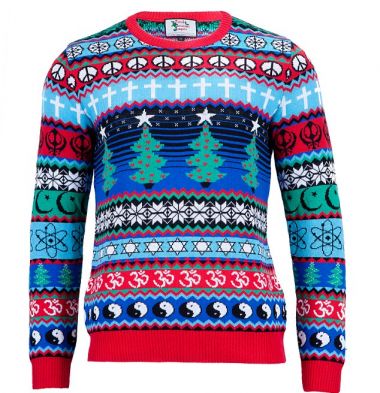Multicultural jumper is a knit too far

It's one of those seasonal favourites, as reliable as mince pies, roast turkey and the annual hapless vicar saying something stupid in a school assembly: Christians getting all angsty about whether the-real-meaning-of-Christmas is being submerged in a swamp of Political Correctness, which has usually Gone Mad.
That's why Birmingham is forever branded as the city that introduced Winterval, no matter how hotly the council denied it. That's why there's the ridiculous fad for saying Happy Holidays instead of Happy Christmas – far more advanced in America than in our own green and pleasant land, but making inroads all the same – because the latter "might offend someone".
According to the Daily Mail, it was "only a question of time" before someone would invent the 'Multicultural Christmas Jumper'. That may not be entirely true – a world in which this garment remained uninvented seems perfectly plausible – but nevertheless, someone has done it. Heaven knows, these things are not the hautest of couture at the best of times – remember the ones worn by Colin Firth's Mark Darcy in Bridget Jones' Diary? – but this one takes the cinnamon biscuit.
It is adorned with Christmas trees, Christian crosses, Muslim crescents, Jewish stars of David, Yin Yang symbols, CND rondels and various others which I don't recognise. There they all are, in one great knitted manifesto for multi-everything. Indeed, a spokesperson (how very PC!) for British Christmas Jumpers said: "For us, the festive season is a time for celebration and togetherness. And we think that now more than ever, the world could use a little more unity." Then came the telling addition: "It is a Christmas jumper for modern Britain."
To be honest, I'm a bit conflicted about this. Not about the jumper, really not my sort of thing, but about the more extreme reactions to the whole real-meaning-of-Christmas thing. After all, Christmas as we have it today was instigated almost single-handedly by Charles Dickens. It is the insatiable greed of retailers for profit, rather than high-minded theological or evangelistic motives, which drives the enterprise today.
Of course it has a special meaning for Christians, but it is not the primary festival of the Church. Oliver Cromwell even banned it in the name of true religion. So I'm fairly relaxed about people of other cultures celebrating it in different ways and bringing their own things to it. Even as we dig our heels in at the thought of its appropriation by people of other faiths, the real challenge for Christians is to avoid being sucked in to observing it as a commercial festival rather than as a religious one. A jumper is a much easier target than a whole capitalist ecosystem.
Where I draw the line, though, is at any suggestion that difference doesn't matter; that Christianity is just one idea among many, and that it sits perfectly comfortably alongside lots of other faiths and philosophies. Perhaps I'm paranoid, but that's what this design seems to be saying: "We all believe the same things really. All these labels don't really matter. All you need is love: let's have a big group hug."
Ironically enough, for a Christmas jumper, the symbol the designers have chosen to illustrate Christianity is a cross, an image which is profoundly Easter. And it's the cross which brings us up against what, if we are Christians, we believe to be a profound and unavoidable truth: that God raised Jesus from the dead. It is this disruptive, derailing, irritating fact that makes it impossible to go along with the sort of spiritual reductionism epitomised in this Christmas knitware (and arguably in the recent Muslim prayer service at Washington's National Cathedral).
We can, and should, have the deepest respect for other religions and their adherents. But it shows most respect to them, let alone to our own faith, if we let them be themselves: if we don't pretend that there are no differences between us.
In a Christmas sermon in 2012, the then Archbishop of Canterbury, Rowan Williams, spoke of how the hostility towards religion in our culture seemed to to be dying down a little. He went on: "Yet, granted all this, and given all the appropriate expression of relief Christians may allow themselves, Easter raises an extra question, uncomfortable and unavoidable: perhaps 'religion' is more useful than the passing generation of gurus thought; but is it true?" The Bible, he points out, says that "God raised Jesus to life."
Unpick that from Christianity, and the whole thing unravels. Woolly jumpers, whether we'd wear them or not, are one thing; woolly theology is another.











